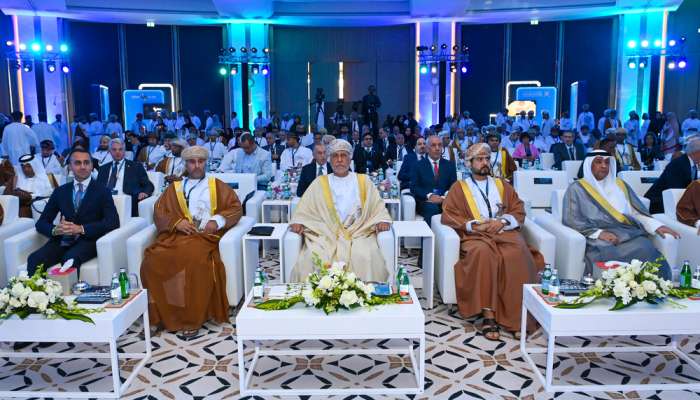
MUSCAT: Oman signalled its growing ambition as a global investment hub with the opening of the Advantage Oman Forum 2025, where more than 300 global participants, including over 100 CEOs from 30 countries, gathered to map the future of sustainable growth, innovation, and economic resilience.
The two-day forum, inaugurated by HH Sayyid Shihab bin Tarik Al Said, Deputy Prime Minister for Defence Affairs, at the St. Regis Al Mouj Muscat, on Sunday set the tone for a decisive shift in Oman’s investment narrative—positioning the Sultanate as a strategic, stable, and forward-looking destination amid growing global uncertainty.
Designed as a high-level platform linking government leaders, private sector executives, and international investors, the Advantage Oman Forum’s opening day featured five dynamic sessions that delved into the global investment outlook, risk management strategies, environmental challenges, leadership innovation, and the critical role of brand trust and storytelling in modern economies.
The opening session, "Setting the Stage: A Global Outlook on Investment", was moderated by Richard Quest, Editor-at-Large at CNN Business, and featured strategic perspectives from H.E. Abdulsalam Al Murshidi, President of the Oman Investment Authority, and H.E. Qais bin Mohammed Al Yousef, Minister of Commerce, Industry, and Investment Promotion, Mohamed AlAbbar, Founder, Emaar Properties, Dr Abdulla Babood, Chair of the State of Qatar for Islamic Area Studies at Waseda University and Michelle Karavias, Managing Director and Head, Industry research, Fitch Solutions. Discussions underscored Oman’s commitment to regulatory transparency, green growth, and fostering an agile, diversified economy fit for the future.
In his keynote address, H.E. Qais bin Mohammed Al Yousef stressed that Oman is entering a new phase of economic momentum, citing a 16.2% rise in foreign direct investment (FDI) in Q3 2024 compared to the previous year, a BBB- credit rating upgrade with a stable outlook by S&P Global, and a forecasted GDP growth of 3.4% for 2025 — outperforming many global peers.
Speakers emphasised Oman’s core strengths - its geographic connectivity linking Asia, Africa, and Europe, leadership in energy transition, particularly in green hydrogen and renewables, institutional governance aligned with international standards, and its unique cultural and economic bridge between East and West.
Throughout the day, several recurring themes emerged. Among them are that the future of investment is inseparable from sustainability, innovation, and technology; green and blue economies are central pillars of future national strategies; cross-border collaboration, risk-resilient financing, and smart public-private partnerships are increasingly critical, and investors must embrace resilience, agility, and strategic alliances to thrive amid global disruption.
The second session, "The Risky Business” brought attention to the role of risk culture and psychological safety in enabling organisations to make bold decisions. It was moderated by H H Dr Adham Al Said, Assistant Professor, Department of Economics, Sultan Qaboos University. The speakers included H E Eng Saeed Al Maawali, Minister of Transport, Communications and Information Technology, H E Azzan Al Busaidi, Undersecretary, Ministry of Tourism and Heritage for Tourism and Chairman of OMRAN and Creon Butler, Director, Global Economy and Finance Programme at Chatham House.
Discussions included how companies that adapt quickly and manage uncertainty can emerge stronger, using examples of businesses that navigated disruption successfully.
The third session, "A Defining Moment” focused on the corporate world's growing accountability for environmental stewardship. Moderated by Najla Al Jamali, Chief Executive OQ Alternatiive Energy, the speakers included H E Eng Salim Al Aufi, Minister of Energy and Minerals, H E Dr Abdullah Al Amri, Chairman Environment Authority and Luigi Di Maio, Special Representative for the Gulf Region at European Union and former Foreign Minister of Italy.
Experts discussed solutions such as adopting the circular economy model, investing in green technologies, and the vital importance of public-private collaboration to mitigate climate change and preserve biodiversity.
The fourth session, "Beyond the Comfort of Certainty," highlighted how modern leadership demands flexibility, creativity, and the willingness to break from traditional models. Speakers shared real-world examples of organisations that reinvented themselves and thrived by embracing innovation.
Dr Florian Klein, Co-founder and Managing Partner at ananki.ai moderated the session that witnessed H E Dr Said Al Saqri, Minister of Economy, Mohammed Al Ardhi, Chairman, Muscat Stock Exchange and Executive Chairman Investcorp and Yusuff Ali M. A, Founder and Chairman Lulu Group International.
The final session, "Storytelling Nations: Power, Perception and Place," explored how businesses can move beyond raw data to create narratives that resonate emotionally with customers, building lasting brand loyalty and trust — essential assets in an increasingly crowded global market.
Richard Quest moderated the engaging session that witnessed the participation of H E Salim Al Mahrouqi, Minister of Heritage and Tourism, Mohammed Al Barwani, Chairman, MB Holding Group, Dushyant Thakor, Deputy Executive Director at WAIPA (World Association of Investment Promotion Agencies) and Johanthan McClory, Research Associate, Hertford College, Oxford University.
Earlier in the morning, HH Sayyid Shihab bin Tarik Al Said toured an accompanying exhibition that featured major government entities, private sector companies, and investment opportunities across logistics, tourism, energy, manufacturing, technology, and food security.
Participants praised the clarity of Oman’s Vision 2040 strategy, which focuses on empowering the private sector, nurturing national talent, balancing environmental protection with development, and promoting diversified economic growth beyond oil and gas.
Despite acknowledging global headwinds — such as geopolitical volatility, inflationary pressures, and market fragmentation — the overall mood was one of optimism. Oman’s firm steps toward economic diversification, energy transformation, and regulatory modernisation were seen as strong signals for serious global investors.
Tomorrow, the Advantage Oman Forum will transition to direct Government-to-Business (G2B) engagement sessions, offering investors an opportunity to meet senior government officials across key sectors. The agenda will also feature success story presentations and a landmark signing ceremony — expected to reinforce Oman's shift from dialogue to action, strengthening its standing as an emerging force in the global investment ecosystem.